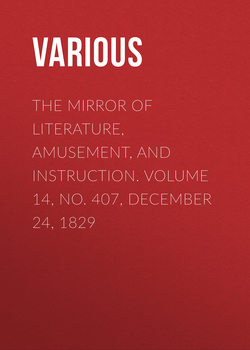The Mirror of Literature, Amusement, and Instruction. Volume 14, No. 407, December 24, 1829

Реклама. ООО «ЛитРес», ИНН: 7719571260.
Оглавление
Various. The Mirror of Literature, Amusement, and Instruction. Volume 14, No. 407, December 24, 1829
PREFACE
MEMOIR OF THOMAS CAMPBELL, ESQ
DIRGE OF WALLACE
LINES WRITTEN ON VISITING A SCENE IN ARGYLESHIRE
Отрывок из книги
Of the subject of this memoir, it has been remarked, "that he has not, that we know of, written one line, which, dying, he could wish to blot." These few words will better illustrate the fitness of Mr. Campbell's portrait for our volume, than a laudatory memoir of many pages. He has not inaptly been styled the Tyrtaeus of modern English poetry, and one of the most chaste and tender as well as original of poets. He owes less than any other British poet to his predecessors and contemporaries. He has lived to see his lines quoted like those of earlier poets in the literature of his day, lisped by children, and sung at public festivals. The war-odes of Campbell have scarcely anything to match them in-the English language for energy and fire, while their condensation and the felicitous selection of their versification are in remarkable harmony. Campbell, in allusion to Cymon, has been said to have "conquered both on land and sea," from his Naval Odes and "Hohenlinden" embracing both scenes of warfare.
Scotland gave birth to Thomas Campbell. He is the son of a second marriage, and was born at Glasgow, in 1777. His father was born in 1710, and was consequently nearly seventy years of age when the poet, his son, was ushered into the world. He was sent early to school, in his native place, and his instructor was Dr. David Alison, a man of great celebrity in the practice of education. He had a method of instruction in the classics purely his own, by which he taught with great facility, and at the same time rejected all harsh discipline, substituting kindness for terror, and alluring rather than compelling the pupil to his duty. Campbell began to write verse when young; and some of his earliest attempts at poetry are yet extant among his friends in Scotland. For his place of education he had a great respect, as well as for the memory of his masters, of whom he always spoke in terms of great affection. He was twelve years old when he quitted school for the University of Glasgow. There he was considered an excellent Latin scholar, and gained high honour by a contest with a candidate twice as old as himself, by which he obtained a bursary. He constantly bore away the prizes, and every fresh success only seemed to stimulate him to more ambitious exertions. In Greek he was considered the foremost student of his age; and some of his translations are said to be superior to any before offered for competition in the University. While there he made poetical paraphrases of the most celebrated Greek poets; of Aeschylus, Sophocles, and Aristophanes, which were thought efforts of extraordinary promise. Dr. Millar at that time gave philosophical lectures in Glasgow. He was a highly gifted teacher, and excellent man. His lectures attracted the attention of young Campbell, who became his pupil, and studied with eagerness the principles of sound philosophy; the poet was favoured with the confidence of his teacher, and partook much of his society.
.....
In Germany Campbell made the friendship of the two Schlegels, of many of the first literary and political characters, and was fortunate enough to pass an entire day with the venerable Klopstock, who died just two years afterwards. The proficiency of Campbell in the German language was rendered very considerable by this tour, and his own indefatigable perseverance in study. His travels in Germany occupied him thirteen months; when he returned to England, and, for the first time, visited London. He soon afterwards composed those two noble marine odes, The Battle of the Baltic, and Ye Mariners of England, which, with his Hohenlinden, stand unrivalled in the English tongue; and though, as Byron lamented, Campbell has written so little, these odes alone are enough to place him unforgotten in the shrine of the Muses.
In 1803 the poet married Miss Sinclair, a lady of Scottish descent, and considerable personal beauty, but of whom he was deprived by death in 1828. He resided at Sydenham, and the entire neighbourhood of that pleasant village reckoned itself in the circle of his friends; nor did he quit his suburban retreat until, in 1821, literary pursuits demanded his residence in the metropolis. It was at Sydenham, in a house nearly facing the reservoir, that the poet produced his greatest work, Gertrude of Wyoming, written in the Spenserian stanza. About the same time Campbell was appointed Professor of Poetry in the Royal Institution, where he delivered lectures which have since been published. He also undertook the editorship of Selections from the British Poets, intended as specimens of each, and accompanied with critical remarks.3
.....